“The God of Gods” script discovered in Nova Scotia University Library
Why is this such an important discovery for the Okanagan? Why is it so important for Okanagan Archive Trust Society to have a copy of this play? I’ll explain:
Naramata pioneer, Carroll C. Aikins, is probably best known for founding the “Home Theatre” in the south Okanagan in November 1920. His famous play, The God of Gods, was produced in England that same year.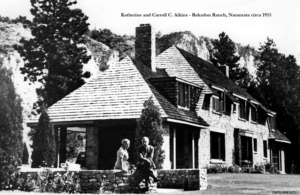
Born in 1888 into a distinguished family, Carroll Aikins might have been expected to follow a successful business or political career. His maternal grandfather, the Honourable C.C. Colby, represented Stanstead, Quebec in the House of Commons from 1867 to 1891. His paternal grandfather, James Cox Aikins, was Secretary of State under MacDonald and became Lieutenant Governor of Manitoba. His uncle, Sir J.A.M. Aikins, was also Lieutenant-Governor of Manitoba. His father, Somerset Aikins, sat for a short time in the Manitoba Legislature.
It was for the sake of his health and to offer Carroll a living, that his father sent him to the Okanagan in 1908, to join long-time family friends, the Robinsons, in Naramata where the first section of the eventual hundred acres of sage-covered lakeside property, (later named ‘Rekadon’ meaning ‘house by the water’) was purchased for the purpose of developing a fruit-growing operation.
In 1912, Carroll married Katherine Foster, the daughter of the American Consul-General of Ottawa. With her personality and Vassar education she was to have become an ideal partner in the Home Theatre venture, performing major roles, directing and assisting with the teaching.
If the newspaper and magazine articles of the early 1920’s are to be believed, Canada enjoyed many theatrical “firsts” in 1921 and 22, including the first national theatre company in Canada, the first Greek drama presented in Canada, and the first passion play ever given in Canada. These events reflected the national cultural renewal that was present in the post-World War One years. The surprising thing, though, is that that all these “firsts” took place in a theatre located in “the middle of an orchard in the sparsely populated rural hills of central British Columbia” rather than in urban Montreal or Toronto.
No doubt Aikins made personal contact at the English repertory theatres that had formed in Liverpool, Manchester, and Birmingham, for it was at this last theatre that his play, The God of Gods, was produced in a two-week run in 1919, with a set designed by the famed Barry Jackson. The influence of these companies can be seen in Aikins’ emphasis on ensemble acting and in the encouragement of new playwrights, as well as in the construction principles of theatre building.
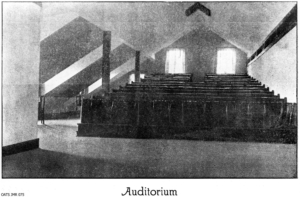
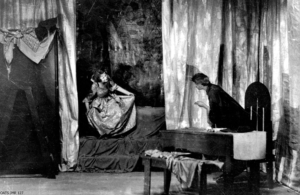
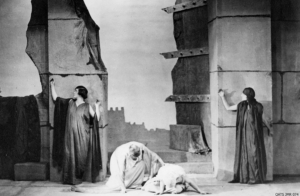
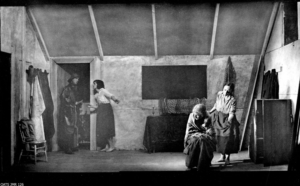
His was not the “first” for Naramata. J.M. Robinson’s wife, Eliza, was a seasoned thespian and had opened an opera house above the general store in the new town in 1910. She was thrilled to participate in many of Aikins’ plays and helped back stage.
During WWI, having been refused the opportunity of military service, Aikins supervised the work in his orchards, and engaged in a number of creative projects. He was seriously writing at this time and published his book of romantic poetry. He was also completing The God of Gods, a melodramatic story about a “devout Indian maiden.” Billed on the Birmingham Repertory program as “An American Indian Play.” The English reviewers generally liked the play, praising its “rare artistic delicacy.” (One personal problem for Aikins, was that he was unable to travel to England at the time to see the production, even though it provoked sufficient interest to bring about another staging at the Everyman Theatre in 1931.)
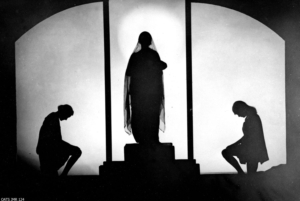
As the world entered the post-war era, so faded the interest in Aikins’ Home Theatre. With 1922 fruit prices at an all time low, the student workers who performed could not be paid and the theatre was no more.
The accomplishment of Aikins in his Home Theatre was that, besides achieving a number of apparent “firsts” in Canadian theatre, he briefly realized the dream of a Canadian art theatre, and his goals; to stage plays in pure ‘art’ productions, free of commercial or even amateur methods were admirable.
It is here that we must appreciate the efforts of Kailin Wright, Ph.D., who is the assistant professor of English at St. Francis Xavier University in Antigonish, Nova Scotia. When she contacted me, it was to add a personality to the Aikins name.
It also completed my search for the play that had taken me to the British performance libraries for over 10 years.
So what do we do with the play? We find a way to perform it. There must be a theatre company in the Okanagan who would be capable of taking on an iconic, classical play and making it their own. We shall see.
Editor
I have located a few examples of Carroll Aikins poetry. Here is a poem published in British Columbia Magazine for December 1911. It’s really flowery, even for that era.
British Columbia
Land of last hope and latest victory,
Great warden-warrior of the Western gate,
Holding with steel-shod hand the sea in check
To lead it, humbled, to thy harborings
Conceived in torment of Titanic strife,
Rugged of feature, but gentle heart,
For in each deep division of thy hills
Lie haven-valleys, hope and happiness.
Long was the treasure of thy heritage
By the elusive, unguessed twilight veiled,
For at the cloudless dawning of thy day
In the dull East old Gaspe’s sunset dies.
Last art thou, latest born and loveliest,
Where, as a giant child, thy body lies
Blue-bathed in the Pacific, crowned above
With sun-gold gossamer on silver snows.
God guide thee onward! Thee, the latest born!
And from the mighty marble of thy youth
Chisel a manhood, stalwart and serene,
Worthy to bear the sceptre or the sword.
Let it be strong and virile, tender too,
Filled with the spirit of thy gentleness,
Eternal justice and eternal truth.
As, age by age, time’s tireless legions pass!
